Linnea Tanner's Blog, page 20
July 31, 2023
Book Spotlight Buccaneer: The Early Life and Crimes of Philip Rake Chris Thorndycroft #Pirates #Caribbean #Swashbuckling #NavalFiction #BlogTour #NewRelease #TheCoffeePotBookClub @cthorndycroft @cathiedunn
I am pleased to spotlight the book, Buccaneer: The Early Life and Crimes of Philip Rake (The Molucca Star Quartet Book 1) by Chris Thorndycroft in The Coffee Pot Book Club Blog Tour. The author newly released this Historical Action and Adventure novel (232 pages) today, 1st August 2023.
Below are highlights of Buccaneer: The Early Life and Crimes of Philip Rake and Chris Thorndycroft’s author bio.

Blog Tour Page: https://thecoffeepotbookclub.blogspot.com/2023/06/blog-tour-buccaneer-early-life-and-crimes-of-philip-rake.html
HIGHLIGHTS — THE EARLY LIFE AND CRIMES OF PHILIP RAKE
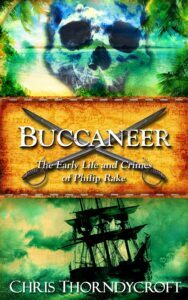
Buccaneer: The Early Life and Crimes of Philip Rake
(The Molucca Star Quartet Book 1)
By Chris Thorndycroft
Blurb:
Bristol, 1713. When Philip Rake, pickpocket, smuggler and scoundrel is arrested and thrown in jail, he assumes he has a short walk to the gallows. But his father, a wealthy merchant who has remained a figure of mystery throughout his life, throws him a lifeline; become an indentured man on an expedition to the East Indies led by his friend, Woodes Rogers.
Woodes Rogers is looking for Libertatia – the fabled pirate kingdom of the legendary buccaneer Henry Avery – and the hoard of treasure rumoured to be hidden there. But Philip wants his freedom and when he learns that there are men onboard who once sailed with Henry Avery and plan to take the treasure for themselves, he jumps ship and embarks upon a career of piracy.
Philip’s story takes him from the backstreets of Bristol to the sun-baked hills of Madagascar and on to the tropical islands of the Caribbean in a thrilling tale of adventure in which he rubs shoulders with some of the most notorious pirates of the age, including Blackbeard, Charles Vane, Anne Bonny and Mary Read.
Buy Links:
This title will be available to read on #KindleUnlimited.
Universal Link: https://mybook.to/Buccaneer
Amazon UK: https://www.amazon.co.uk/dp/B0C9TWGMZJ/
Amazon US: https://www.amazon.com/dp/B0C9TWGMZJ/
Amazon CA: https://www.amazon.ca/dp/B0C9TWGMZJ/
Amazon AU: https://www.amazon.com.au/dp/B0C9TWGMZJ/
AUTHOR BIO: CHRIS THORNDYCROFT

Chris Thorndycroft’s writing career began with short horror stories which appeared in magazines and anthologies such as Dark Moon Digest and American Nightmare.
His first novel under his own name was A Brother’s Oath, book one in the Hengest and Horsa trilogy, which deals with the beginning of Anglo-Saxon England. He has always had a passion for historical fiction, kindled at the age of six when he first saw Errol Flynn in The Adventures of Robin Hood (1938). His books are deeply grounded in real history but often reimagine legends such as King Arthur and Robin Hood, weaving them in with historical events.
He currently lives in Norway with his wife and two kids.
Social Media Links:
Website: https://christhorndycroft.wordpress.com/
Twitter: https://twitter.com/cthorndycroft
Facebook: https://www.facebook.com/ChrisThorndycroftAuthor/
Instagram: https://www.instagram.com/christhorndycroft/
TikTok: https://www.tiktok.com/@christhorndycroft
Amazon Author Page: https://www.amazon.co.uk/Chris-Thorndycroft/e/B015EQARZM
Goodreads: https://www.goodreads.com/author/show/8130216.Chris_Thorndycroft


Instagram Handle: @thecoffeepotbookclub
July 19, 2023
Book Spotlight Under the Emerald Sky Juliane Weber #HistoricalFiction #HistoricalRomance #Ireland #BlogTour #BookBlast #TheCoffeePotBookClub @Writer_JW @cathiedunn
I am pleased to spotlight the book, Under the Emerald Sky: A Tale of Love and Betrayal in 19th Century Ireland by Juliane Weber in The Coffee Pot Book Club Blog Tour. The author released this Historical Fiction / Historical Romance novel on 23 October 2020 (465 pages).
Below are highlights of Under the Emerald Sky and Juliane Weber’s author bio.

Tour Schedule Page: https://thecoffeepotbookclub.blogspot.com/2023/06/blog-tour-irish-fortune-series-by-juliane-weber.html
HIGHLIGHTS: UNDER THE EMERALD SKY

Under the Emerald Sky: A Tale of Love and Betrayal in 19th Century Ireland
The Irish Fortune Series Book 1
by Juliane Weber
Blurb:
“Under the Emerald Sky reaches another level in storytelling, the kind where the characters remain with you long after you have closed the book.” – The Historical Fiction Company
It’s 1843 and the Englishman Quinton Williams has come to Ireland to oversee the running of his father’s ailing estate and escape his painful past. There he meets the Irishwoman Alannah O’Neill, whose family is one of few to have retained ownership of their land, the rest having been supplanted by the English over the course of the country’s bloody history. Seeing the injustices of Victorian Ireland, Alannah’s brother Kieran has learned to hate the English and imperialism. Aware of Kieran’s hostility towards the English, Alannah keeps her growing relationship with Quin a secret – but it’s a secret that can’t be kept for long from those plotting to end England’s oppression of the Irish people. As Quin and Alannah seek happiness in the face of hate and revenge, an action-packed romance ensues.
But all the while, disaster looms – the Great Famine that would forever change the course of Ireland’s history. With repeated failure of the potato harvest upon which most Irish families depend, thousands will go hungry, with sickness and starvation sweeping through Irish farms, decimating poor populations for years to come.
Can Quin and Alannah find happiness in a land teetering on the brink of disaster?
Buy Links:
This series is available to read on #KindleUnlimited.
Under the Emerald Sky (Book 1)

ebook discounted to $0.99 / £0.99
Beneath the Darkening Clouds (Book 2)
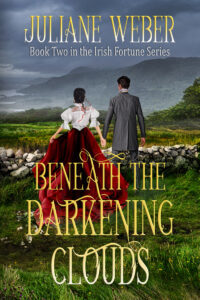
Amazon UK Amazon US Amazon AU Amazon CA
Irish Fortune Series

Amazon UK Amazon US Amazon AU Amazon CA
AUTHOR BIO: JULIANE WEBER

Juliane Weber is a scientist turned historical fiction writer, and author of the Irish Fortune Series. Her stories take readers on action-packed romantic adventures amid the captivating scenery and folklore of 19th century Ireland.
Under the Emerald Sky, the first book in the Irish Fortune Series was awarded bronze medals in The Historical Fiction Company 2021 Book of the Year Contest and The Coffee Pot Book Club 2022 Book of the Year Contest. The second book in the series, Beneath the Darkening Clouds, was awarded a bronze medal in The Historical Fiction Company 2022 Book of the Year Contest.
Juliane spent most of her life in South Africa but now lives with her husband and two sons in Hamelin, Germany, the town made famous by the story of the Pied Piper.
Social Media Links:
Website: https://www.julianeweber.com/
Twitter: https://twitter.com/Writer_JW
Facebook: https://www.facebook.com/JulianeWeberAuthor
LinkedIn: https://www.linkedin.com/in/julianeweber/
Instagram: https://www.instagram.com/juliane._.weber/
Book Bub: https://www.bookbub.com/profile/juliane-weber
Amazon Author Page: https://www.amazon.com/Juliane-Weber/e/B08M3DYY22/ref=dp_byline_cont_pop_ebooks_1
Goodreads: https://www.goodreads.com/author/show/21207265.Juliane_Weber

Instagram handle: @thecoffeepotbookclub
July 17, 2023
Elizabeth St.John The Godmother’s Secret #HistoricalFiction #PrincesInTheTower #Audiobook #BlogTour #TheCoffeePotBookClub @ElizStJohn @cathiedunn
Please welcome Elizabeth St. John again as the featured author in The Coffee Pot Book Club Audiobook Blog Tour held July 18th — July 20th and July 25th, 2023. Elizabeth St. John is the author of the Historical Fiction, The Godmother’s Secret, released by Falcon Historical (print) on 4th October 2022 (361 pages). Tantor Media released the audiobook narrated by the author on 27th June 2023 (11 hours 59 minutes).
Below are highlights of The Godmother’s Secret, Elizabeth St. John’s author bio, and a snippet and link to a clip of her audiobook.

Blog Tour Page: https://thecoffeepotbookclub.blogspot.com/2023/06/blog-tour-godmothers-secret-audiobook.html
HIGHLIGHTS: THE GODMOTHER’S SECRET
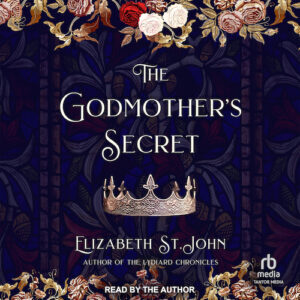 The Godmother’s Secret
The Godmother’s Secret
By Elizabeth St.John
Audiobook narrated by Elizabeth St.John
Blurb:
“An extremely well-written book with depth and complexity to the main characters. The author says she wanted to write a book about family love and tolerance, and a woman’s loyalty and courage. She has done so. This is the best book I’ve read in ages!” The Ricardian Bulletin, Richard III Society
“The authenticity and historical research displayed within this story is immense and exquisite. Ms. St. John is sure to be a newfound favorite for fans of not only this fractious time in English history, but of all historical fans who adore rich, immersive prose.” Historical Fiction Company 2022 Book of the Year
“A very enjoyable read. The historical veracity is impeccable, and Elysabeth is a likeable, admirable character who faces interesting dilemmas with love and courage.” Historical Novel Society
If you knew the fate of the Princes in the Tower, would you tell? Or forever keep the secret?
May 1483: The Tower of London. When King Edward IV dies and Lady Elysabeth Scrope delivers her young godson, Edward V, into the Tower of London to prepare for his coronation, she is engulfed in political turmoil. Within months, the prince and his brother have disappeared, Richard III is declared king, and Elysabeth’s sister Margaret Beaufort conspires with her son Henry Tudor to invade England and claim the throne.
Desperate to protect her godson, Elysabeth battles the intrigue, betrayal, and power of the last medieval court, defying her Yorkist husband and her Lancastrian sister under her godmother’s sacred oath to keep Prince Edward safe. Bound by blood and rent by honour, Elysabeth is torn between King Richard and Margaret Beaufort, knowing that if her loyalty is questioned, she is in peril of losing everything—including her life.
Were the princes murdered by their uncle, Richard III? Did Margaret Beaufort mastermind their disappearance to usher in the Tudor dynasty? Or did the young boys vanish for their own safety? Of anyone at the royal court, Elysabeth has the most to lose–and the most to gain–by keeping secret the fate of the Princes in the Tower.
Inspired by England’s most enduring historical mystery, Elizabeth St.John blends her family history with known facts and centuries of speculation to create an intriguing story about what happened to the Princes in the Tower .
Buy Links:
Audiobooks Promo: https://www.audiobooks.com/promotions/promotedBook/680002/godmothers-secret
Audiobook Buy Link: https://geni.us/TGSAudible

The ebook is available to read on Kindle Unlimited.
Universal Buy Link: https://geni.us/GodmothersSecret
AUTHOR BIO: ELIZABETH ST.JOHN
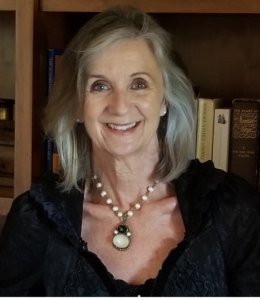
Elizabeth St.John’s critically acclaimed historical fiction novels tell the stories of her ancestors: extraordinary women whose intriguing kinship with England’s kings and queens brings an intimately unique perspective to Medieval, Tudor, and Stuart times.
Inspired by family archives and residences from Lydiard Park to the Tower of London, Elizabeth spends much of her time exploring ancestral portraits, diaries, and lost gardens. And encountering the occasional ghost. But that’s another story.
Living between California, England, and the past, Elizabeth is the International Ambassador for The Friends of Lydiard Park, an English charity dedicated to conserving and enhancing this beautiful centuries-old country house and park. As a curator for The Lydiard Archives, she is constantly looking for an undiscovered treasure to inspire her next novel.
Elizabeth’s books include her trilogy, The Lydiard Chronicles, set in 17th Century England during the Civil War, and her newest release, The Godmother’s Secret, which explores the medieval mystery of the missing Princes in the Tower of London.
Social Media Links:
Website: http://www.elizabethjstjohn.com/
Twitter: https://twitter.com/ElizStJohn
Facebook: https://www.facebook.com/ElizabethJStJohn
LinkedIn: https://www.linkedin.com/in/elizabethjstjohn/
Instagram: https://www.instagram.com/elizabethjstjohn/
Book Bub: https://www.bookbub.com/authors/elizabeth-st-john
Amazon Author Page: https://geni.us/AmazonElizabethStJohn
Goodreads: https://geni.us/GoodreadsElizStJohn
AUDIO LINK & SNIPPET 2: THE GODMOTHER’S SECRET

Audio Link to go with Snippet: https://youtu.be/5ohiQOzJ6gE
2 Autumn 1470 | Westminster Sanctuary
As a toll marks the end of mass, Meg returns, and the midwife arrives in a swirl of fog and wood smoke with her bag of scissors and linens and vials of mugwort and pennyroyal electuaries, a rabbit’s foot, and St. Margaret’s birthing girdle to ensure an easy labour. The crone smells strongly of her workroom spirits, but her hands appear steady.
The relentless abbey bells mark the longest hours. The room is so dark night loiters within. The scent of purifying lavender oil mingles with stinking melting tallow and smoke from the damp logs. The hours pass with no sign of the child, and then creeps over us a sharp odour of fear-sour sweat, drenching the queen’s moans.
“This is not like the others,” she pants, her stomach mounded over her long slender legs. “There is something wrong.”
The midwife leans over her, casting a humpbacked shadow on the wall. “Hush, my lady,” she says. “Your child is just slow to arrive. Bite down on this kerchief, and do not push further, for just a moment.”
The queen cries, her body rigid. Meg bathes her forehead with a damp cloth. I beckon the midwife to the fireside. The crone’s lined face gleams with perspiration, and the smell of fear is strongest from her.
“What is happening?” I demand. “The queen employed you because she trusts you. This birth is going on for too long.”
The midwife wipes her mouth with the back of her hand. “The queen is narrow,” she says. “And the baby is large. That is all.” She turns away from me, hunches over her bag, and rummages for another curative. This time she places a dried toad upon the queen’s stomach, arranging it this way and that with deliberate care, chanting an unintelligible rhyme as she does so.
I turn my back on the woman, shaking my head. I do not put much store in these witching tokens, but if the queen does, then it is her decision.
“Belle-Maman!” Meg hisses. “Look!”
The midwife is tipping a stone bottle into her mouth and drinking the contents. She sees me looking at her and quickly drops it back into the bag.
“What are you doing?” I cry. “Are you drunk, woman?”
The midwife laughs and pulls the bottle forth. “Want some? Prepare yourself, Lady Scrope.”
“Get away from me.” I smack her hand.
The crone sneers. “And you think you can do more? From what I’ve felt, the cord is wrapped around the child. If it is not freed, the queen will kill it. And likely herself too.”
 Instagram handle: @thecoffeepotbookclub
Instagram handle: @thecoffeepotbookclub
July 9, 2023
Welcome to Day 1 of Breakfield and Burkey’s “INTRODUCING ENIGMA TRACER” Blog Tour! @EnigmaSeries @4WillsPub @4WP11 @RRBC_Org @linneatanner
GIVEAWAYS:
Please leave the authors a comment below for your chance to win one of these awesome prizes!
BLOG POST: ENIGMA TRACER

Enigma Heirs, the new leadership of the R-Group and CATS, team together to stop an environmental gangster at the request of a friend. It becomes personal when people you know are at risk of captivity or death. Gracie uses all the family business resources to rise to the challenge. JJ provides the technology resources, but will they be enough?
The information dynasties of the R-Group and the CATS-Cyber Assassins Technical Services – team inherited new leaders, Gracie and Juan Jr., or JJ, as he prefers. By design, they’ve been trained their whole lives to maintain the moral high ground in today’s digital world of cyber combat against bad actors from the Darknet.
During this interview snippet with Aimee, check out what Breakfield and Burkey said about their newest book in near-real time.
By the way, Aimee loves the stunt Breakfield & Burkey pull in this short interview on YouTube. Enjoy! https://youtu.be/ZHO-TJ2Bhuw
BOOK BLURB: ENIGMA TRACER
The clock is ticking … can Gracie uncover the truth?
Phillip Pliant is the wealthy opportunist plastics dealer and CEO of Pliant Industries. He’s also a master thief—creating a pervasive threat to the manufacturing infrastructure in the Caribbean islands markets. With the cartel as his stealth client, the naïve city leaders have been seduced, enabling the production of more than 3-dimentional building materials.
And set the stage for massive chaos and destruction.
Pliant has locked up contracts, assets, and control of any future expansion. His contacts and clients salivate over their probable financial reward—the expected profits are monstrous.
Is the R-Group, now led by Gracie and the family heirs, strong enough to win against this predator? Can JJ’s CATS (Cyber Assassin Technology Services) act on the root-cause analysis in time?
Will the R-Group and CATS sabotage Pliant’s plan before it’s too late?Can Jeff and Keith use their covert skills to put the bad guys away for good?Will Gracie be able to squash Pliant and the cartels?Can the chain of islands survive the underhanded tactics and threats?
Gracie never considered that their lives would hang between winning and losing. Will the devious plot be uncovered in time? The clock is ticking. Five … four … three …
AUTHOR BIO: BREAKFIELD & BURKEY

BREAKFIELD – Charles works as a data/telecom solution architect and supports digital security, blockchain solutions, and unified communications. He enjoys writing, studying World War II history, travel, and cultural exchanges. Charles’ love of wine tastings, cooking, and Harley riding often provides writing topics.
Much of his personality comes from his father who served in the military for 30 years and three wars. Charles grew up on multiple bases and different countries. The multi-cultural exposure helps him with the various character perspectives they bring to the series. His personal ambition is to continue to teach Burkey humor.
BURKEY– Rox is a Customer Experience Specialist who works with businesses worldwide. As a gifted speaker and accomplished listener, she bridges the chasm between business problems and technical solutions to optimize business productivity. She has written technology and white papers, but launches into high gear when plotting our next technothriller or short story.
She led the other kids with her highly charged imagination generating new adventures with make-believe characters as a child. She is proud of being a Girl Scout until high school and contributed to the community as a member of a Head Start program. Rox enjoys her family, learning, listening to people, traveling, outdoor activities, sewing, cooking, and thinking about diversifying the series.
BREAKFIELD AND BURKEY began their writing partnership with non-fictional papers and books, then formed a business LLC as fictional storytellers. They recognize that stories are an evolving method to share excitement, thrills, and insights into today’s technology risks. EnigmaSeries.com has samples of the Enigma Series novels, short stories, audiobooks, and book trailers, with the newest series Enigma Heirs releasing in March 2023. They’ve earned multiple awards for their fictional creations. Contact them via email at Authors@EnigmaSeries.com.
They are passionate about leveraging real technology into fictional writing. The variety of character attributes from the many people who crossed their professional paths adds that depth. Admittedly, Breakfield often asks people he meets if they thought about being an evil cyberthug or femme fatale in their series.
Both authors have traveled to many places around the world. These travels are pulled into stories adding realism to specific locals. They enjoy well-rounded thrillers that include humor, romance, intrigue, suspense, and mystery.
They love to talk about their stories at private and public book readings or events. They are proud members of the Rave Reviews Book Club for more than three years. Find their books and information about this supportive club – https://ravereviewsbookclub.wordpress...
SOCIAL MEDIA LINKS:
Website: https://www.EnigmaSeries.com/
YouTube: https://www.youtube.com/channel/UC6Vz4x5ctTnx3yUhZk1OJkw
Rox Burkey Website: https://roxburkey.com/
Twitter: https://twitter.com/1rburkey
Twitter Book Series: https://twitter.com/EnigmaSeries
AMAZON OR OTHER PURCHASE LINKS:
Website: https://www.enigmabookseries.com/
Amazon Buy Link: https://rb.gy/t0w80
Barnes and Noble: https://www.barnesandnoble.com/w/enigma-tracer-charles-breakfield/1143154085?ean=9781946858658
To follow along with the rest of the tour, please visit the authors‘ tour page on the 4WillsPublishing site. If you’d like to schedule your own blog tour and have your book promoted in similar grand fashion, please click HERE. Thanks for supporting this author and her work!

July 6, 2023
Luv Lubker Under His Spell #UnderHisSpell #TheRivalCourts #VictorianFiction #HistoricalFiction #BlogTour #TheCoffeePotBookClub @LubkerLuv @cathiedunn
Please welcome Luv Lubker to The Coffee Pot Book Club Blog Tour held between July 3rd — July 7th, 2023. Luv Lubker is the author of the Historical Fiction, Under His Spell (The Rival Courts), released by Historium Press on May 30 2023 (384 pages).
Below are highlights of Under His Spell, Luv Lubker’s author bio, and an excerpt from her book.

Tour Schedule Page: https://thecoffeepotbookclub.blogspot.com/2023/05/blog-tour-under-his-spell-by-luv-lubker.html
HIGHLIGHTS: UNDER HIS SPELL
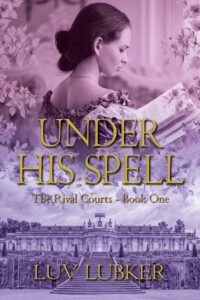
Under His Spell
(The Rival Courts)
By Luv Lubker
Audiobook (coming soon):
Ella McNish, Jamie Collette, Max Mustache, Christian Stark, Ju Thomas, Philip Zielinzki, Michael Garamoni
Blurb:
A beautiful love story between the Princess Royal Victoria and Fritz Wilhelm, Frederick III of Prussia
A lonely young man attends the first World’s Fair – the Great Exhibition of 1851 – and meets a family who changes his life forever.
Follow the young Prince Fritz – later Friedrich III – of Prussia and his wife, Queen Victoria’s eldest daughter, Vicky, (parents of Kaiser Wilhelm II) through their courtship and the joys and struggles of their first four years of marriage.
Fritz and Vicky dream of a peaceful united Germany, but Fritz’s uncle Karl has his own dreams of power…
Discover often hinted at but unrevealed secrets of the Prussian Royal court…
Buy Links:
Universal Link: https://books2read.com/u/4AA28k
Amazon UK: https://www.amazon.co.uk/dp/B0C5J75V1P
Amazon US: https://www.amazon.com/dp/B0C5J75V1P
Amazon CA: https://www.amazon.ca/dp/B0C5J75V1P
Amazon AU: https://www.amazon.com.au/dp/B0C5J75V1P
Barnes and Noble: https://www.barnesandnoble.com/w/under-his-spell-luv-lubker/1143496988
Kobo: https://www.kobo.com/gb/en/ebook/under-his-spell-25
AUTHOR BIO: LUV LUBKER

Luv Lubker has lived in the Victorian era half her life, making friends with the Brontë sisters and the extended family of Queen Victoria. Now she knows them quite as well as her own family.
Born in a cattle trough in the Appalachian mountains, Luv lives in Texas – when she comes to the modern world.
When she isn’t living in the Victorian era, she enjoys being with her family; making and eating delicious raw food, riding her bike (which she only learned to ride at 25, though she’d ridden a unicycle since she was 7), and watching animals – the passion of her childhood.
Social Media Links:
Website: https://therivalcourts.com
Twitter: https://twitter.com/LubkerLuv
Facebook: https://www.facebook.com/luvy.lubker
Author Facebook: https://www.facebook.com/TheRivalCourts
LinkedIn: https://www.linkedin.com/in/luv-lubker-1916b81b0
Instagram: https://www.instagram.com/llubker/
Pinterest: https://www.pinterest.com/luvlubker/
Amazon Author Page: https://www.amazon.com/stores/Luv-Lubker/author/B0C5TRY327
Goodreads: https://www.goodreads.com/author/show/21511046.Luv_Lubker
EXCERPT: UNDER HIS SPELL

“Ich weiß nicht…” he murmured, and again, with a deep sigh, turned his face uneasily away from her, carefully taking his hands from her chest and putting one on her shoulder, one on her waist, then, just holding her hands again. He continued, “I don’t know… I – I don’t know how to speak to you. I mean, I – don’t know any words that aren’t – improper – I mean – coarse and vulgar. I – I can’t even make myself call you Meine Liebchen or Schatzi – It is just –”
“Do you mean to say you don’t like me to call you Mein Schatz or Liebling16?”
“Oh, nein, Vicky! Your words are so pure and clean. But – what will others think if I just call you Vicky – it seems so strange and stiff for a husband not to call his wife by some endearment – they will think we are like all the others…”
“Fritz, what does it matter what others think of what you call me? That is a private matter between us, isn’t it?”
“I know; it is really just that – everything is – tainted – in my mind, I do not want to have those thoughts when I am with you. Besides your parents, your family, almost everything I know is so – wrong – almost all the endearments I ever hear are either in sarcasm or such situations as I do not wish to associate with our love – And – oh!” He rose and walked through the room. “How can I take you into that! You don’t know what it is!” His voice trembled. “I don’t want anything to happen to you, Vicky! I – I don’t want to see you suffer.”
She rose, and put her arms round Fritz’s neck and kissed him. They had been alone for two hours, as husband and wife, and had not even kissed since they left the chapel. Fritz held her tight in his arms, returning her kiss. She broke away. “Fritz, don’t be afraid. You can’t contaminate me. YOU are so pure, I love you so much for all these thoughts! Thank you, thank you for – everything. I am your wife now, you are my husband, it is right, and pure, and clean, for you to have these thoughts about me! Don’t – don’t – I don’t know, you have lived in such different circumstances than I have, and I have always been so – sheltered, I suppose, but, I can try to see what you mean from what you have told me, and what Papa and others have. I will do anything for you, Fritz, and will go anywhere with you. I trust you!”
“I don’t know…”
 Instagram Handle: @thecoffeepotbookclub
Instagram Handle: @thecoffeepotbookclub
July 4, 2023
Kelly Evans Turning the World to Stone #HistoricalFiction #Renaissance #histfic #BlogTour #TheCoffeePotBookClub @chaucerbabe @cathiedunn
Please welcome Kelly Evants to The Coffee Pot Book Club Blog Tour held between July 4th — July 6th, 2023. Kelly Evans is the author of the Historical Fiction, Turning the World to Stone: The Life of Caterina Sforza Part One 1472 to 1488, released by Eska Publishing on 2 May 2023 (385 pages).
Below are highlights of Turning the World to Stone, author bio for Kelly Evans, and an excerpt from her book.

Blog Tour Page: https://thecoffeepotbookclub.blogspot.com/2023/05/blog-tour-turning-world-to-stone.html
HIGHLIGHTS: TURNING THE WORLD TO STONE
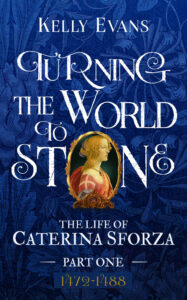
Turning the World to Stone
The Life of Caterina Sforza Part One 1472 to 1488
by Kelly Evans
Blurb:
Vilified by history, Caterina Sforza learned early that her life was not her own. Married at age ten, she was a pawn in the ever-changing political environment of Renaissance Italy.
Resigned to her life as a fifteenth-century wife, Caterina adapted to the role she was expected to play: raising and educating her children, helping the poor in her new home, and turning a blind eye to her husband’s increasingly shameful behaviour. But Fate had other plans for her, and soon Caterina’s path would be plagued by murder, betrayal, and heartbreak.
“Could I write all, the world would turn to stone.”
Buy Links:
This title is available to read on #KindleUnlimited.
Universal Link: https://mybook.to/Caterina
Amazon UK: https://www.amazon.co.uk/Turning-World-Stone-Caterina-Sforza/dp/1778022421
Amazon US: https://www.amazon.com/Turning-World-Stone-Caterina-Sforza-ebook/dp/B0C1HZHT93
Amazon CA: https://www.amazon.ca/Turning-World-Stone-Caterina-Sforza-ebook/dp/B0C1HZHT93
Amazon AU: https://www.amazon.com.au/Turning-World-Stone-Caterina-Sforza-ebook/dp/B0C1HZHT93
AUTHOR BIO: KELLY EVANS

Born in Canada of Scottish extraction, Kelly Evans graduated in History and English then moved to England where she worked in the financial sector. While in London Kelly continued her studies in history, concentrating on Medieval History, and travelled extensively through Eastern and Western Europe.
Kelly is now back in Canada with her husband Max and a rescue cat. She writes full-time, focussing on illuminating little-known women in history with fascinating stories. When not working on her novels, Kelly writes Described Video scripts for visually impaired individuals, plays oboe, and enjoys old sci-fi movies.
Social Media Links:
Website: https://www.kellyaevans.com
Twitter: https://twitter.com/ChaucerBabe
Facebook: https://www.facebook.com/kellyevansauthor
Instagram: https://www.instagram.com/kellyevansauthor/
Pinterest: https://www.pinterest.ca/kellyewrites/
Book Bub: https://www.bookbub.com/profile/kelly-evans
Amazon Author Page: https://www.amazon.com/stores/Kelly-Evans/author/B0187JGTOQ
Goodreads: https://www.goodreads.com/author/show/14335541.Kelly_Evans\
EXCERPT: TURNING THE WORLD TO STONE
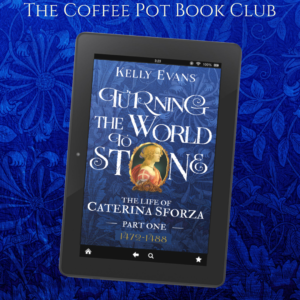
“There is something I must do.” She turned to Luisa. “I need you to stay here and remain with the children.” To Bossi, she said, “And you’ll need to remain here too.”
“I don’t care where you’re going, Madonna, but I am going with you. Nowhere is safe right now.”
“I need you here.”
“I’ll see that my best men are left here, if that will ease your mind.” He waited, watching her face.
“Fine. But I am resolute and will brook no argument nor hear words that will sway me from my path.” Bossi nodded his agreement. “This is the only way to ensure my husband will live through these next days and assure I still have some control.” They looked at her expectantly as she turned to a mirror to put on a pair of riding gloves. Turning back to them, she smiled grimly.
“I am going to capture the Castel Sant’Angelo.”
“You’re going to storm the stronghold?” Bossi asked incredulously.
Caterina smiled. “No. I’m going to walk in and ask for it.”
 Instagram Handle: @thecoffeepotbookclub
Instagram Handle: @thecoffeepotbookclub
June 29, 2023
Book Review The Hussar’s Duty Griffin Brady #HistoricalFiction #WingedHussars #BlogTour #TheCoffeePotBookClub @griffbrady1588 @cathiedunn
It is my pleasure to host Griffin Brady again as the featured author in The Coffee Pot Book Club Blog Tour that is being held between June 19th — June 30th, 2023. Griffin Brady is the author of the Historical Fiction novel, The Hussar’s Duty (The Winged Warrior Series, Book 3), released by Trefoil Publishing on May 18th, 2023 (538 pages).
I previously reviewed the first book in the series, The Heart of a Hussar, set during the 17th-century Polish-Muscovite war, a period with which I was not familiar. The first novel had everything I enjoyed reading in epic historical fiction — fully developed characters, adventure, romance, political intrigue, and world-building. The third book continues the rich tradition of the first book and motivates me to read the second book in the series, A Hussar’s Promise.
Below are highlights of The Hussar’s Duty, Griffin Brady’s author bio, and my 5-star review of her novel.
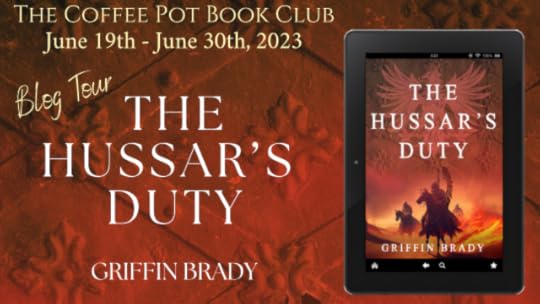
Tour Schedule Page: https://thecoffeepotbookclub.blogspot.com/2023/04/blog-tour-hussars-duty-by-griffin-brady.html
HIGHLIGHTS: THE HUSSAR’S DUTY
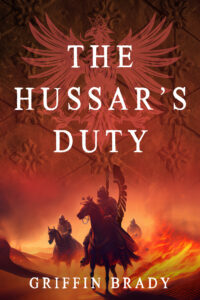
The Hussar’s Duty
(The Winged Warrior Series)
by Griffin Brady
Blurb:
Poland’s most valiant winged hussar is called to fight in a campaign ripe for disaster. But he must also protect those he loves from jackals waiting to pounce. How does he choose between duty and devotion when death is on the line?
When Sultan Osman II sends Poland’s envoy packing, the Commonwealth must prepare for war against one of the largest armies the Ottomans have ever assembled. Tasked with repelling the invasion is Grand Hetman of the Crown Stanisław Żółkiewski, and he knows who to turn to: Jacek Dąbrowski, the Commonwealth’s most valiant Polish winged hussar.
Jacek has been idle far too long, and the call to arms is a siren’s song he can’t resist. But he has built a life far from the battlefield with his wife, Oliwia, and their children. If he pursues his quest for glory, who will safeguard them?
Oliwia knows her husband is restless. In fact, she’s been sending Jacek on cross-country errands for years in the hopes of quelling his lust for battle. When she realizes her efforts are futile, she resolves herself to letting him go—after hatching a scheme to accompany him.
Honor. Obligation. Devotion. These forces push and pull Jacek in different directions. His country needs him, but so does his family. Where does his duty lie? His choice will cause catastrophic ripples no matter which path he follows … and could very well bring the loss of his loved ones or his life.
Will the cost of defending king and country prove too steep for this warrior?
This is a standalone continuation in The Winged Warrior Series.
Buy Links:
This title is available to read on #KindleUnlimited.
Universal Link: https://readerlinks.com/l/3336453
Amazon US: https://www.amazon.com/dp/B0C2VZ2963/
Amazon UK: https://www.amazon.co.uk/dp/B0C2VZ2963/
Amazon AU: https://www.amazon.com.au/dp/B0C2VZ2963/
Amazon CA: https://www.amazon.ca/dp/B0C2VZ2963/
AUTHOR BIO: GRIFFIN BRADY

Griffin Brady is an award-winning historical fiction author with a keen interest in the Polish Winged Hussars of the 16th and 17th centuries. She is a member of the Historical Novel Society and Rocky Mountain Fiction Writers. Her debut novel, The Heart of a Hussar, was a finalist for the 2021 Chaucer Early Historical Fiction Award and a 2021 Discovered Diamond.
The proud mother of three grown sons, she lives in Colorado with her husband. She is also an award-winning bestselling romance author who writes under the pen name G.K. Brady.
Social Media Links:
Website: https://www.griffin-brady.com/historical-fiction/
Twitter: https://twitter.com/griffbrady1588
Facebook: https://www.facebook.com/AuthorGriffinBrady
Book Bub: https://www.bookbub.com/profile/griffin-brady
Amazon Author Page: https://www.amazon.com/author/griffinbrady
Goodreads: https://www.goodreads.com/author/show/20675881.Griffin_Brady
BOOK REVIEW: THE HUSSAR’S DUTY
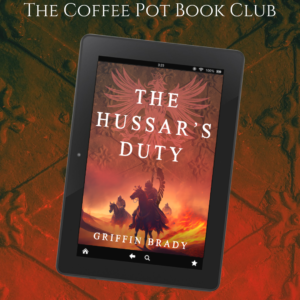
Loyalties and honor are blurred in war-torn Poland in the historical fiction novel, The Hussar’s Duty by Griffin Brady, as the Polish-Lithuanian Commonwealth prepares to fight Ottoman troops at the Battle of Cecora in 1620. Book 3 in the Winged Warrior series continues the saga of Jacek Dabrowski, an elite Hussar commander, and his wife, Oliwia, an heiress of the estates of her former husband. Although this is the 3rd book in the series, with sufficient backstories from Book 1 (The Heart of a Hussar) and Book 2 (A Hussar’s Promise), it can be read as a standalone. However, it would be helpful to read the first two books to fully grasp Jacek and Oliwia’s ordeals before marrying.
Even though Jacek is in marital bliss raising Oliwia’s son, fathered from her former husband, and their own two children, the estate is plagued with financial hardship. Another challenge is Oliwia’s teenage brother’s rebellion against training under the mentorship of Jacek. A soldier itching for action and glory, Jacek is pulled from a sense of duty to fight for his former seventy-year former commander, Stanisław Żółkiewski, in a possible confrontation with the Ottoman Empire. Like many disputes throughout history, the goal of protecting the ruler of the neighboring kingdom of Moldavia seems like a just cause. What Jacek does not expect are the divisive loyalties of mercenaries and magnates lacking in discipline and morale. His duty as a Hussar and his undying love for his family is tested in the hell of the Battle of Cecora.
Author Griffin Brady has masterfully written a gripping family saga with strong elements of romance interwoven into action/adventure. It is a character-driven tale in which Oliwia and Jacek fundamentally change due to their life-threatening circumstances. The author’s meticulous research is evidenced by her descriptive details of the Polish culture, political turmoil between the warring Polish Commonwealth and Ottoman Empire, and battle scenes. She stays true to actual events and terms used in the period. A glossary of terms and historical figures’ backgrounds are bonuses at the back of the book.
The tale starts slowly but sets the stage for the climactic battle steeped in action, unexpected twists, and heart-wrenching scenes in which you don’t know who will survive. The tension becomes razor-sharp in the last half of the book when Jacek recognizes that everything he believes as an honorable warrior is turned on its head. Immoral mercenaries and wavering magnates fight for their self-interest. He questions the judgment of his aging commander, who leads them into a battle where they are outnumbered. The universal themes of duty vs. love, corrupt political power, sacrifice, and friendship are explored in this riveting story. It has a satisfying ending that will leave you pondering the justice of war.
Readers who enjoy historical romantic adventure will become immersed in Jacek’s struggle to balance love for his family and to seek glory and ambition in his duty as a Hussar to the sovereignty of Poland. Highly recommended.

Instagram Handle: @thecoffeepotbookclub
June 18, 2023
J R Tomlin The Douglas Bastard Book Review #HistoricalFiction #MedievalScotland #BlogTour #TheCoffeePotBookClub @tomlinjeanne @cathiedunn
I am pleased to host J R Tomlin as the featured author in The Coffee Pot Book Club Blog Tour that is being held between June 12th — June 23rd, 2023. J R Tomlin is the author of the Historical Fiction, Scottish Historical Fiction, The Douglas Bastard (Archibald the Grim Series, Book 1), released by the author on 26th April 2022 (185pages).
Below are highlights of The Douglas Bastard, J R Tomlin’s author bio, and my 5-star review of her novel.
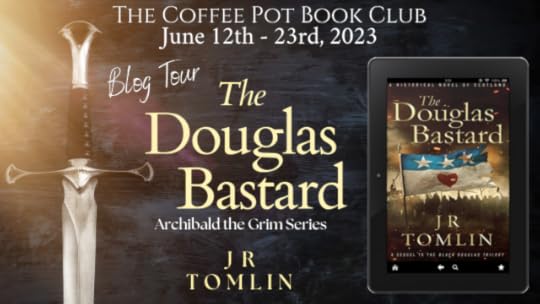
Tour Schedule Page: https://thecoffeepotbookclub.blogspot.com/2023/04/blog-tour-archibald-the-grim-series.html
HIGHLIGHTS: THE DOUGLAS BASTARD
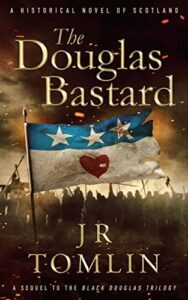
The Douglas Bastard
(Archibald the Grim Series)
By J R Tomlin
Blurb:
Young Archibald, the Black Douglas’s bastard son, returns from exile to a Scotland ravaged by war. The war-hardened Knight of Liddesdale will teach him what he must learn. And with danger on every side, he must learn to sleep with one eye open and a claymore in his hand because even their closest ally may betray them…
Buy Links for The Douglas Bastard:
Universal Link: https://books2read.com/u/4AAwdp
Amazon UK: https://www.amazon.co.uk/dp/B0968X5V3Y
Amazon US: https://www.amazon.com/dp/B0968X5V3Y
Amazon CA: https://www.amazon.ca/dp/B0968X5V3Y
Amazon AU: https://www.amazon.com.au/dp/B0968X5V3Y
Barnes and Noble: https://www.barnesandnoble.com/w/the-douglas-bastard-a-historical-novel-of-scotland-j-r-tomlin/1140930069
Kobo: https://www.kobo.com/ebook/the-douglas-bastard
iBooks: https://books.apple.com/us/book/id1606972264
Google Play: https://play.google.com/store/books/details/J_R_Tomlin_The_Douglas_Bastard?id=AM12EAAAQBAJ
THE DOUGLAS THE GRIM SERIES

Buy Links for Douglas the Grim Series:
Amazon UK: https://www.amazon.co.uk/dp/B0BDW1VJ61
Amazon US: https://www.amazon.com/dp/B0BDW1VJ61
AUTHOR BIO: J R TOMLIN

J R Tomlin is the author of twenty historical novels.
Her historical novels are mainly set in Scotland. You can trace her love of that nation to the stories of Robert the Bruce and the Black Douglas that her grandmother read her when she was small and to her hillwalking through the Scottish Cairngorms where the granite mountains have a gorgeous red glow under the setting sun.
In addition to having lived in Scotland, she has traveled in the US, mainland Europe and the Pacific Rim. She now lives in Oregon.
Social Media Links:
Website: www.jrtomlin.com
Twitter: https://twitter.com/TomlinJeanne
Book Bub: https://www.bookbub.com/profile/j-r-tomlin
Amazon Author Page: https://www.amazon.com/stores/J.R.-Tomlin/author/B002J4ME1S
Goodreads: https://www.goodreads.com/author/show/4094154.J_R_Tomlin
BOOK REVIEW: THE BASTARD DOUGLAS
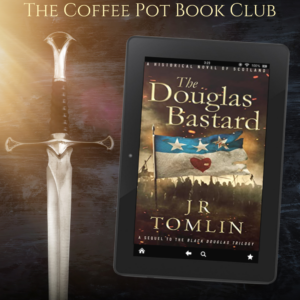
The Douglas Bastard by J. R. Tomlin is the first book in the series about Archibald Douglas, the bastard son of James Douglas, during the reign of King David II in 14th Century Scotland. It is a coming-of-age story about Archibald, orphaned as a nine-year-old boy and exiled to France with the young king. Archibald is placed under the care of Sir William Douglas, with whom he returns to Scotland to take back castles and lands from the English, setting the stage for King David’s return. Archibald rises in rank from squire to knight and ultimately fights in the disastrous Battle of Neville’s Cross, where the king is wounded and captured.
Author Tomlin has created an intriguing tale told from the first-person perspective of Archibald as he matures from an idealistic boy to a battle-hardened young man who becomes disheartened by the political machinations of noblemen pledged to fight for the king. Though conditioned to obey his superiors, Archibald sometimes disregards commands and openly questions Sir Williams’ brutal act of capturing and murdering a rival, whom the king had appointed as constable of Roxburgh and Sheriff of Teviotdale.
Vibrant descriptions of historical events ring true, such as a tournament hosted by the English during a temporary truce. The final chapters vividly describe the gut-wrenching horror of battle at Neville’s Cross. Archibald fiercely fights to protect his king, but he soon recognizes the hopeless situation when disloyal commanders and their men retreat and abandon them.
For those unfamiliar with the history of Scotland, it may be difficult to grasp how some of the characters are related to each other. The dialogue uses the Scottish dialect, but a glossary that defines the distinct terms is helpful.
Those who enjoy reading medieval Scottish fiction should find The Douglas Bastard an intriguing start to the epic saga of the historical figure known as Archibald the Grim.

Instagram Handle: @thecoffeepotbookclub
June 16, 2023
Loveland, CO Barnes & Noble Book Fair #Colorado #Books #Gifts #Weekend #BookReaders #AuthorEvent @BNBuzz @judithbiles
I wanted to let you know about a great opportunity to meet some local authors at the Barnes & Noble Book Fair in Loveland, Colorado on Saturday, June 17th, 2023. The event will be held at The Barnes & Noble shop at Centerra, located at 5835 Sky Pond Drive in Loveland. The event will run from 9:00 am – 5:00 pm and will be a great chance to discover new books and connect with other book lovers. 
Need ideal books for Dad! Local authors and I will be there to sign and sell books to support the Colorado Authors’ Hall of Fame and its scholarship opportunities for writers. Barnes & Noble is a generous supporter of Colorado authors and the AuthorYOU community under the leadership of Dr. Judith Briles. Any books and other store merchandise purchased by visitors at the Loveland Barnes & Noble store on June 17th will generate a donation to support the Colorado Authors’ Hall of Fame, which grants the Aspiring Authors Scholarships.
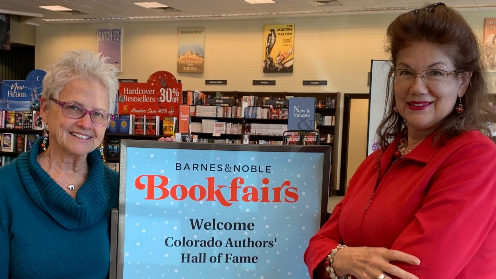
I’ll be there with my books from the Curse of Clansmen and Kings series, along with other award-winning authors of fiction and nonfiction authors of all genres: adult, YA, juvenile, and children’s books.
Hope to see you there!

June 6, 2023
Book Review The Enigma Beyond Charles Breakfield and Rox Burkey #BookReview #Technothriller #ActionAdventure #FictionalThriller #AI #Artificialntelligance #MachineLearning #R-Group #BreakfieldBurkey #EnigmaSeries @1RBURKEY
I’m pleased to provide my 5-star review of the Techno-Thriller, The Enigma Beyond (The Enigma Series Book 11). Artificial intelligence (AI) is no longer science fiction. The Enigma Beyond realistically depicts the modern-day danger of AI.


The Enigma Beyond: -A Techno Thriller
by Charles V. Breakfield and Rox Burkey
The human-like computer, HAL, from 2001: The Space Odyssey, is no longer science fiction. The line distinguishing supercomputers from humankind is blurring. Do the risks of artificial intelligence (AI) outweigh the benefits? What is truth in the different realities of social media?
These questions are explored in the techno-thriller The Enigma Beyond by Charles Breakfield and Rox Burkey. A geopolitical group, MAG, strives to dominate all elements of society: politics, social media, finance, healthcare, and military defenses worldwide. A new generation in the R-Group and their supercomputer ICABOD — a global organization formed to combat threats on the Dark Net—are assigned to investigate inconsistencies in how NORAD’S computerized defense system communicates.
The story interweaves various subplots that are connected. Johanna escapes a compound of captives who are guarded by drones. Tony narrowly escapes the elimination of NORAD’S staff by drones as the computerized defense system, JOAN, prepares to join forces with the Chinese space station CHIANG. Together, the systems will control two-thirds of the planetary defense systems from space. Tara is extorted to present mesmerizing pitches to considerable crowds in exchange for medical treatment of her paralyzed daughter. Gracie joins Global Bank to uncover a secret account that funnels money from unwary investors. Can the R-group’s bright, enthusiastic teen apprentices outmaneuver the machines on the Dark Net?
Co-Authors Breakfield and Burkey have written a thought-providing novel about the potential threats of AI in the modern world. Unfortunately, the potential benefits of AI are offset by the danger that the technology will be abused. Even scarier, computers could take on the persona of their creators who have ill intent. Will machines become self-aware and rebel against their human creators and guards?
The story is told effectively from an omniscient point of view. The perspective can shift from one entity to another in a scene. It could be a human or a computer adopting human qualities. For example, NORAD’S computerized system, JOAN, takes on the avatar of a modern-day Joan of Arc. Although I was unfamiliar with some of the technical terms, the story was nonetheless an engaging eye-opener to the potential abuse of AI. The chapters are short, and scenes move quickly from one subplot to another without missing a beat. I enjoyed the dangerous political games humans and supercomputers play to uncover secrets and outmaneuver each other. Truth and misinformation often blur, leading to unexpected twists.
I recommend The Enigma Beyond to readers who enjoy techno-thrillers and are curious about the potential risks of rapidly developing AI, for which we do not have a crystal ball to predict if it will be the beginning of a new golden age or the doom of humanity.
HIGHLIGHTS: THE ENIGMA BEYOND

The Enigma Beyond: -A Techno Thriller
(The Enigma Series Book 11)
By Charles Breakfield & Rox Burkey
Narrator/VoiceActor: Derek Shoales
Blurb:
Automation of humanity’s demise – Artificial intelligence
Technologists make computers faster. Computers are ingesting all the data from around the world, good, bad, or indifferent.
These machines can think—big mistake.
Decision making wars between Artificially Intelligence supercomputers and humans recently kicked into overdrive. Algorithms deliver manufactured choices to individuals and organizations to growing number of personal devices to drive decisions. Continued seduction of mankind becomes eminent unless stopped by our champions.
R-Group, information experts, leverage their next generation youth to rise to the new threats of modern technology. These evolving specialists are poised to compete with complex adversaries run by greedy technological geniuses.
Training of new R-Group family members is real-time cyber assault events. Working with ICABOD, R-Group’s treasured supercomputer, is their best weapon for this battle.
MAG, the consortium of global technology predators, united to bring their insidious plans for technology domination to the world stage.
Everyone caught in the cyber crosshairs realize time’s up!
Technical oligopolies want to dictate their terms for control of political, healthcare, finances, and orbiting defense systems.
Can the champions of the R-Group intercept the MAG group?
Who will win the AI wars?
What readers are saying –
“This latest book in the series is a wake-up call about AI and robots, giving you a feeling of being too close to home.?
“It is an edge of your seat, mind-blowing, realistic and far-reaching thriller that will leave you with nightmares. These are the monsters one cannot see, but they are there, nonetheless.”
“Another great adventure towards the end of the series. There is always something to learn.”
Book Buy Links:
Available on Kindle Unlimited?
Universal Amazon UK Amazon US Amazon CA Amazon AU Barnes and Noble
AUDIOBOOK: THE ENIGMA BEYOND

Audiobook Buy Links:
BOOK TRAILER: THE ENIGMA BEYONDOVERVIEW: THE ENIGMA SERIES

R-Group is a group of cyber heroes supporting their clients, businesses, and governments from tyranny by the bad actors of the Darknet. They use their technological, financial, and dedicated resources to find the sources of evil exploits and expose them to the authorities.
The Box Set edition for Books 1-3 of the Enigma Series includes The Enigma Factor, The Enigma Rising, and The Enigma Ignite. The first-generation R-Group began in 1939 in Poland when three patriots tried to hit back at the German invaders by taking their encryption device and learning its secrets. The three men risked their lives to help make a difference in humanity. Their moral principles were handed down through the generations. These guidelines are instilled in their modern-day support as the cyber good guys beat back the cyber criminals oozing all over the Darknet. Each tale uses today’s contemporary issues, such as identity theft, stealing satellite communications, or capitalizing on battlefield communications.
Though each story is a stand-alone, characters continue to grow and evolve throughout the entire series. The technology used in these fictional thrillers is accurate. Who will win and keep the scales tipped in favor of humankind is at the heart of the thrillers.
Buy Links to The Enigma Series
Books in Series Available on Kindle Unlimited?
AUTHOR BIOS: CHARLES BREAKFIELD AND ROX BURKEY

BREAKFIELD – Charles works as a data/telecom solution architect and supports digital security, blockchain solutions, and unified communications. He enjoys writing, studying World War II history, travel, and cultural exchanges. Charles’ love of wine tastings, cooking, and Harley riding often provides writing topics.
Much of his personality comes from his father who served in the military for 30 years and three wars. Charles grew up on multiple bases and different countries. The multi-cultural exposure helps him with the various character perspectives they bring to the series. His personal ambition is to continue to teach Burkey humor.
BURKEY– Rox is a Customer Experience Specialist who works with businesses around the world. As a gifted speaker and accomplished listener, she bridges the chasm between business problems and technical solutions to optimize business productivity. She has written technology papers, white papers, but launches into high gear when plotting our next technothriller or short story.
As a child, she led the other kids with her highly charged imagination generating new adventures with make believe characters. She is proud of being a Girl Scout until high school, and contributed to the community as a member of a Head Start program. Rox enjoys her family, learning, listening to people, travel, outdoor activities, sewing, cooking, and thinking about how to diversify the series.
BREAKFIELD AND BURKEY began their partnership writing non-fictional papers and books. They formed a business partnership to share stories as fictional story writers. They recognize storytelling is an evolving method to share excitement, thrills, and insights to today’s technology risks.
They are passionate about leveraging real technology into fictional writing. The variety of characters have attributes from the many people who crossed their professional paths add that depth. Admittedly, Breakfield often asks interesting people he meets if they thought about being an evil cyberthug or femme fatale in their series.
Both authors travels are pulled into stories that requires real knowledge of specific locals. They enjoy well-rounded thrillers that include levels of humor, romance, intrigue, suspense, and mystery.
They love to talk about their stories at private and public book readings or events. Burkey conducts podcast style interviews with a couple of author groups, and enjoys extracting the tidbits from authors, especially new ones. Her first interview was, wait for it, Breakfield. You can learn where they will be from the calendar on their website.
EnigmaSeries.com has information on the Enigma Series, 12 books, 10 short stories, audio books, book trailers, and the newest series Enigma Heirs releasing in 2023. They have proudly earned multiple awards for their fictional creations.
We are also part of the Underground Authors group writing cozy mysteries/murders in the Magnolia Bluff Crime Chronicles. We are committed to providing an installment for Season 2 and Season 3 to accompany The Flower Enigma, released in Season 1.
Social Media Links:
Reach out to authors anytime at their e-mail: Authors@EnigmaSeries.com. Co-authors Rox Burkey and Charles Breakfield look forward to your comments and feedback.
Website Enigma Series YouTube Burkey Website Twitter Burkey Twitter Enigma Series Facebook Burkey
Facebook The Engima Series Breakfield & Burkey Blog Instagram LinkedIn Burkey LinkedIn Breakfield
Amazon Author Page Breakfield Amazon Author Page Burkey



